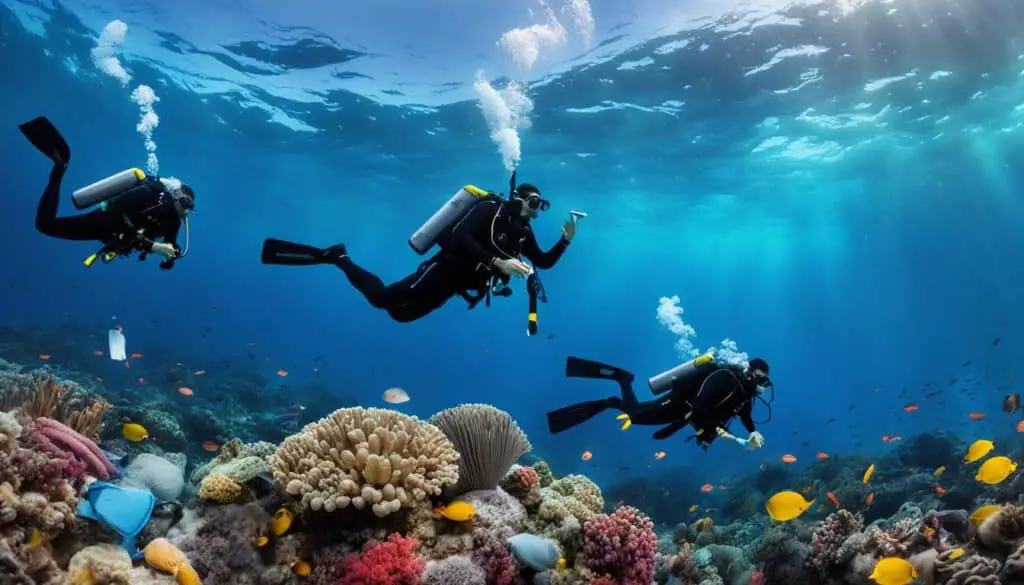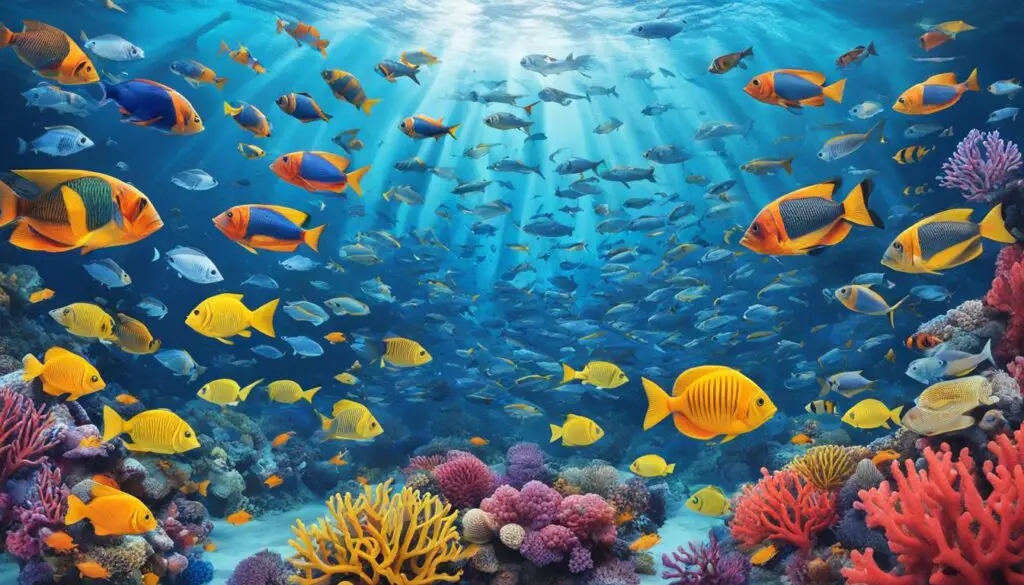Diving and sustainable tourism are like two sides of the same coin. As an avid diver, I am passionate about exploring the underwater world while also ensuring that it remains pristine for future generations. Responsible diving practices not only allow us to connect with the marine ecosystem but also contribute to the conservation of our oceans. In this article, I will delve into the significance of responsible diving, the role of sustainable dive operators, and the importance of marine conservation initiatives.
Key Takeaways:
- Diving and sustainable tourism can coexist, creating an enriching experience for both divers and the environment.
- Responsible diving practices involve minimizing our impact on the underwater world, such as avoiding contact with coral reefs and properly disposing of waste.
- Choosing a sustainable dive operator ensures that our dives align with eco-friendly principles and supports marine conservation efforts.
- Conservation initiatives and marine protected areas play a crucial role in safeguarding the health of our oceans and promoting sustainable diving.
- By actively engaging in responsible diving and supporting sustainable tourism, divers can contribute to a more eco-friendly travel industry.
The Importance of Responsible Diving
Responsible diving is crucial for the preservation of marine life and the health of our oceans. By following eco-friendly diving practices, such as avoiding contact with coral reefs, not disturbing marine life, and properly disposing of waste, divers can minimize their impact on the underwater environment. This helps protect fragile ecosystems and ensures that future generations can continue to enjoy the beauty of our oceans.
Diving enthusiasts have the opportunity to become ambassadors for marine conservation, actively contributing to the protection of underwater habitats and species. By adhering to responsible diving guidelines, divers can have a positive impact on the environment and promote sustainable practices within the diving community.
“Responsible diving is not just about enjoying the underwater world; it’s about taking responsibility for its well-being. By practicing eco-friendly diving, we can ensure that our exploration of the oceans leaves no negative trace behind.”
One of the key aspects of responsible diving is avoiding contact with coral reefs. Coral reefs are delicate ecosystems that provide a habitat for numerous marine species and protect coastlines from erosion. By avoiding physical contact with coral, divers prevent damage to these vital ecosystems and ensure their long-term survival.
Additionally, responsible divers should refrain from disturbing marine life. This means avoiding behaviors such as feeding, chasing, or touching marine animals. By giving marine life the respect and space they deserve, divers can help minimize stress and disruption to their natural behaviors.
Proper waste disposal is another crucial aspect of responsible diving. Divers should never discard any waste, including plastics or fishing lines, into the ocean. Instead, they should collect any trash they encounter during their dives and dispose of it properly after resurfacing. This simple act can prevent marine animals from ingesting or becoming entangled in harmful debris.
To further illustrate the importance of responsible diving, take a look at the table below:
| Benefits of Responsible Diving | Impact on Marine Conservation |
|---|---|
| Preservation of coral reefs and their biodiversity | Ensures the survival of coral reef ecosystems |
| Protection of marine species and their habitats | Reduces disturbance and stress on marine life |
| Reduction of marine pollution | Prevents harm to marine animals and ecosystems |
By practicing responsible diving, divers become advocates for marine conservation and contribute to the preservation of our oceans. Let’s strive to explore the underwater world in a way that promotes the well-being of the marine environment, ensuring its beauty and biodiversity for generations to come.
Sustainable Dive Operators and Certification
Choosing a sustainable dive operator is essential for divers who want to participate in responsible and eco-friendly diving. As an environmentally conscious diver, I understand the importance of selecting dive centers that prioritize marine conservation and promote sustainable practices. By partnering with these eco-friendly dive centers, we can ensure that our underwater adventures have a minimal impact on the delicate marine ecosystem.
When searching for sustainable dive operators, look for those that have received certifications or accreditations for their sustainable practices. Two well-known certifications in the diving industry are the Green Fins certification and the PADI Green Star Award. The Green Fins certification is a comprehensive assessment of a dive operator’s environmental performance, evaluating criteria such as responsible diving practices, waste management, and responsible tourism promotion. On the other hand, the PADI Green Star Award recognizes dive centers that demonstrate a commitment to sustainability in areas such as energy use, water conservation, and community involvement.
By choosing dive centers with these certifications, we can be confident that our diving activities support and contribute to the protection of marine life and the conservation of our oceans. Furthermore, sustainable dive operators often go the extra mile to educate divers about the importance of marine conservation. They provide training on responsible diving practices, such as maintaining buoyancy to avoid unintentional damage to coral reefs and respecting marine life by keeping a safe distance.
“Preserving our oceans starts with making responsible choices as divers.”
When you select a sustainable dive operator, you not only have the chance to explore the breathtaking underwater world, but you also become an advocate for sustainable tourism and the preservation of marine ecosystems. By supporting these eco-friendly dive centers, we can encourage others to follow suit and promote a more sustainable approach to diving and tourism as a whole.

Let’s dive responsibly and make a positive impact on the oceans we love and cherish.
Conservation Initiatives and Marine Protected Areas
Marine protected areas (MPAs) and underwater conservation projects play a crucial role in safeguarding and preserving the health of our oceans. These initiatives focus on protecting fragile marine ecosystems, promoting sustainable diving practices, and ensuring the long-term survival of underwater habitats and species. By actively supporting and participating in these conservation efforts, divers can make a significant impact on the preservation of the underwater environment.
Marine Protected Areas (MPAs)
Marine protected areas are designated zones within the ocean where human activities are regulated to protect marine life and their habitats. These areas serve as invaluable sanctuaries for various species, including coral reefs, seagrass meadows, and marine mammals. MPAs not only conserve biodiversity but also provide a platform for scientific research, education, and eco-tourism.

| Benefits of Marine Protected Areas | |
|---|---|
| 1. Protection of critical habitats and biodiversity | Marine protected areas conserve essential habitats and ensure the survival of diverse marine species. |
| 2. Restoration of damaged ecosystems | By limiting human activities and providing a safe haven, MPAs aid in the restoration of damaged underwater ecosystems. |
| 3. Sustainable fisheries and food security | MPAs contribute to the replenishment of fish stocks and promote sustainable fishing practices, securing a vital food source for coastal communities. |
| 4. Climate change resilience | Healthy marine ecosystems in MPAs provide resilience against the impacts of climate change, such as ocean acidification and rising sea levels. |
Underwater Conservation Projects
Underwater conservation projects involve various initiatives aimed at restoring and preserving the health of marine ecosystems. These projects focus on key areas such as coral reef restoration, marine wildlife conservation, and ocean pollution mitigation.
“In the face of escalating threats to our oceans, underwater conservation projects are crucial for the survival of marine life and the protection of fragile habitats.”
One notable underwater conservation project is coral reef restoration. Coral reefs are vital ecosystems that provide habitat for countless marine species and protect coastlines from erosion. However, they are under immense pressure from climate change, pollution, and destructive human activities. Coral reef restoration projects involve techniques such as coral gardening, artificial reef construction, and the establishment of protected marine areas to regenerate damaged reef systems.
Protecting the Underwater Environment
By actively supporting and participating in conservation initiatives and marine protected areas, divers can contribute to the long-term preservation of the underwater environment. Here are a few ways divers can get involved:
- Volunteer for underwater clean-up efforts to remove debris and prevent pollution.
- Join citizen science programs that collect valuable data on marine life and ecosystems.
- Advocate for the creation and expansion of marine protected areas.
- Choose dive operators and centers that prioritize sustainable and eco-friendly practices.
Together, these collective actions can make a significant difference in the conservation and restoration of our oceans, ensuring that future generations can continue to explore and admire the beauty of the underwater world.
Conclusion
Diving and sustainable tourism are a natural match, offering a harmonious blend of adventure and environmental responsibility. By embracing responsible diving practices, such as respecting marine life and avoiding damage to delicate ecosystems, divers can contribute to the conservation of our oceans.
Supporting sustainable dive operators is another crucial aspect of promoting eco-friendly travel. These operators prioritize sustainable practices, educate divers about marine conservation, and maintain certifications that validate their commitment to protecting the underwater world.
By actively participating in marine conservation initiatives, divers can make a tangible impact on preserving our oceans. From coral reef restoration projects to the establishment of marine protected areas, these efforts create a sustainable environment for both marine life and future generations of divers.
Let’s take the plunge responsibly and advocate for a more eco-friendly and sustainable travel industry. With responsible diving practices, support for sustainable dive operators, and active involvement in marine conservation, we can protect our oceans while enjoying the beauty and wonder of the underwater world.
FAQ
How can I practice responsible diving?
Practicing responsible diving involves following eco-friendly diving practices, such as avoiding contact with coral reefs, not disturbing marine life, and properly disposing of waste. These actions help minimize your impact on the underwater environment and protect fragile ecosystems.
How can I choose a sustainable dive operator?
To choose a sustainable dive operator, look for those that prioritize environmental conservation, adhere to sustainable practices, and educate divers about the importance of marine conservation. Certifications or accreditations like the Green Fins certification or the PADI Green Star Award can also indicate a dive center’s commitment to sustainability.
How can I contribute to marine conservation initiatives?
You can contribute to marine conservation initiatives by supporting and participating in projects that aim to restore coral reefs, conserve marine wildlife, and establish marine protected areas. By actively participating in these efforts, you can make a positive impact on the health of our oceans and the underwater environment.
How do diving and sustainable tourism go together?
Diving and sustainable tourism complement each other perfectly. By embracing responsible diving practices, supporting sustainable dive operators, and actively participating in marine conservation initiatives, divers can play a significant role in promoting sustainable tourism and protecting our oceans. Responsible diving practices help minimize our impact on the environment while allowing us to indulge in the wonders of the underwater world.
